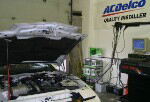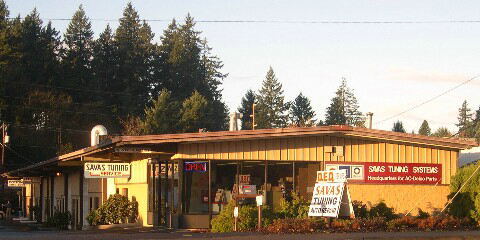|
|
It has been about 20 years since a majority of the newly produced cars & trucks were factory equipped with carburetors. The transition to electronic fuel injection and more efficient fuel and engine management now dominates the marketplace.
Sadly, the majority of manufacturers and suppliers for carburetors and parts have either closed their doors or moved into different products. The manufacturing cost to tool up a production run for any part has risen to the point that many parts will never be produced again.
Many carburetor remanufacturers, rebuilders, and experts have ceased operations due to economic constraints. The quality of a parts store reman or rebuilt carburetor has hit a new low from an already embarrassingly high failure rate.
The competitiveness in the market has forced the average carb rebuilder to cut corners, employ lower skilled workers, and ultimately offer less than desirable products.
We, ourselves, are struggling in many ways but we refuse to reduce the quality of our products. We strive to find ways to locate new parts (NOS) as well as make, engineer, manufacture, machine, and fabricate our own components. We continue to repair stripped threads, including fuel inlet threads. And, we still machine, bush, and rebush throttle shaft assemblies as well as repair warped carburetor castings, bowls, and base plates. Our flow bench which is used to wet flow test our carbs has special maintenance requirements as does our engine dynamometer. The costs to operate our dyno are such that we prefer to run batches to help defray the cost per unit.
The largest challenge of all is the very carburetors we receive for rebuilding. Years of carburetor work, repair, fixes and patch work by others sometimes result in damaged and/or missing linkage, fuel inlet fittings, jets, accelerator pumps, floats, base plates, throttle blades, float bowls, metering rods, springs and other miscellaneous items.
Here is the status of some of the carburetor companies that were once considered the forerunners of carburetion:
- The Holley carburetor company has focused its operations on performance and racing carburetors. Their parts are limited and dwindling.
- The Carter carburetor company closed down in the 1980s, but not before Weber became involved on some production runs in the 1980s.
- The Rochester carburetor company which ran under the parent company of AC Delco / GM has very limited parts availability
- The Stromberg carburetor company closed down in the late 1960s.
- Motorcraft carburetors, and its retired predecessor, Autolite, simply shifted its operation away from carburetors and carburetor parts.
- Weber Carburetor is still producing some carburetors, but in limited quantity. Parts were, and remain, difficult to obtain.
- Zenith Carburetor which predominately focused on agricultural and equipment fuel products is still producing some carburetors, but parts are difficult to obtain.
- Hitachi, Aiisan, Mikuni, Del Orto, Keihn, Mercury, and Nikki are quite limited but are dealer based through Factory dealer network.
Of course there are the performance aftermarket companies which, for the most part, emulate either Holley or Carter engineering. They produce modest numbers with some parts interchangeability to the earlier core products. Those include Edelbrock, Barry Grant, and others.
Carburetor restoration remains a decent market. Whether you have an old Chevrolet, Buick, Cadillac, Oldsmobile, Pontiac, Ford, Dodge, Chrysler, Plymouth, Rambler, AMC, Jeep, Mercury, Datsun, Nissan, Toyota, Honda, Willys, International, GMC, Hudson, Edsel, Mazda, Subaru, Opel, Kaiser, Isuzu, Lincoln, Studebaker, Reo, Desoto, Packard, etc., you may find a carburetor expert in that field.
Are you looking for pros and cons of having your carburetor rebuilt versus exchanging it for a parts house reman? Here is why we recommend a quality in-house rebuild (the first has the most significance):
- When comparing a “Savas” rebuilt carburetor to other remans, the obvious difference is the quality, longevity, and fuel efficiency(for non-high performance applications) of the Savas carburetor.
- The original carburetor (if that’s what you have) is specifically designed and calibrated for your vehicle, making it the best and most efficient option. The reman or rebuilt exchange is usually a conglomeration of different carbs commingled to make one, often resulting in a poor carburetor due to mismatched pieces that have different calibrations via drilled air bleeds, vent ports, air correction, etc. Our FLOW TESTING procedure assures that each carburetor is flowing the intended air/fuel ratio. The current fuel crisis has led many consumers to search for a means to acheive better fuel economy. Upon final flow testing we can assure your carburetor is capable of good gas mileage. However engine design, vehicle design, and state of tune can have negative impacts on fuel economy. If high performance is a primary objective then fuel economy will often be sacrificed.
- (My favorite and most rewarding reason) When we pull apart your carburetor, we can witness any obvious contaminants, or failures as a result of a problem outside the carburetor. An example would be varnish or corrosion inside the carburetor. That evidence will go unnoticed when you exchange your carburetor. Hence the “replacement - rebuilt - reman” carburetor may fail prematurely due to a contaminated fuel system. You lose!
We have a wide selection of quality “Savas” rebuilt carburetors listed in our “eBay Store.” But, if you are unable to find an appropriate carburetor for your vehicle, send in your carburetor. As a rule of thumb, we always prefer to rebuild your original carburetor.
The most common misconception about carburetors: “A fuel filter will prevent my carburetor from corrosion, varnish, rust, and dirt.” Wrong! Filters cannot control the chemical activity of corrosion. The chemical charged element of the contaminated fuel eats away at the carburetor housings and the flaky, scaly byproducts navigate their way through the carburetor, spreading and clogging as they go. For example, varnish is not always corrosive, but is dissolving continually from the fuel tank and leaching forward to the carburetor and fuel pump. This varnish leaves a film as it dries, heats, and contracts, which becomes thicker and stickier as time progresses.
Some fuel filters use inferior filter media resulting in either perforations of the filter paper or disintegration of the material. How long will a household paper towel last under the faucet before it has a hole torn in it? Not long. Often, the filter media found in these filters responds the same way as your household paper towel. Water inside of a fuel filter can only cause problems.
As you browse our web pages on this site you will discover some information as well as definitions. We’ve added this information not only as a means of clarifying information, but also as a spelling guide.
It is always interesting to see how people spell or misspell carburetor and/or the terminology related to carburetors. Admittedly, there is no single correct way to spell carburetor, although there is a socially accepted spelling. But, when I go back through my library of manufacturers books, it is very revealing that there are, or were, many accepted variations on the spelling. For example: carburettor, carborator, carbureter, carbaretor, carbuerator, carburator, etc.
If you think that there may be some benefit to adding to our definition list, please “submit” your idea.
* If you're searching for a carburetor, check our store. If we don't have the one you need, contact us. *
|



